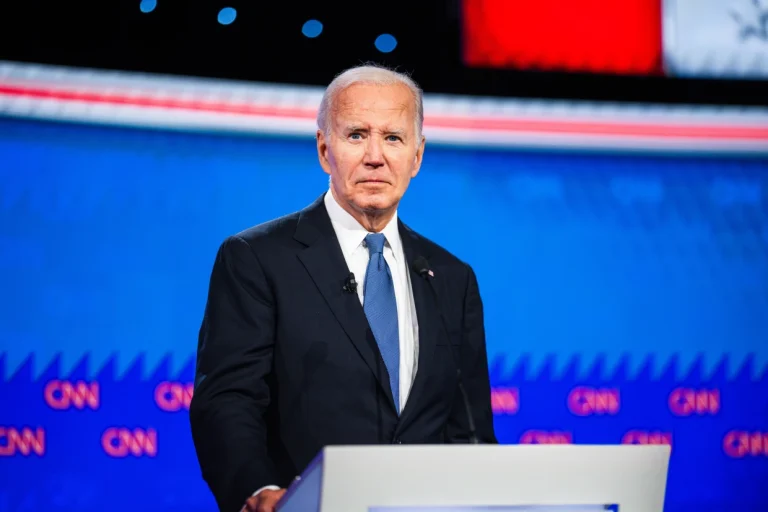WASHINGTON — President Joe Biden found himself four days after a disastrous debate without having personally reached out to top Democratic leaders on Capitol Hill to secure their support, according to sources familiar with the matter. White House Chief of Staff Jeff Zients took on the responsibility of making calls, attempting to mitigate concerns within the party about Biden’s ability to effectively compete against former President Donald Trump. However, frustration is mounting among Democratic lawmakers, some of whom perceive Biden’s inner circle as overly “insulated” and criticize the lack of expected personal outreach from the president himself.
Following his stumbling debate performance, Biden did not initiate direct contact with Senate Majority Leader Chuck Schumer or House Minority Leader Hakeem Jeffries, both influential New York Democrats, nor with other congressional leaders. This decision has surprised and troubled certain lawmakers.
“It’s troubling,” remarked one House Democrat, adding that White House staff should provide transparency, particularly in private conversations with legislators, regarding whether Biden’s debate struggles were an isolated incident or indicative of a broader issue.
While Schumer and Jeffries have refrained from publicly expressing disappointment over the lack of outreach, Schumer’s office declined to comment, and Jeffries’ office did not respond to inquiries. In response to queries about Biden’s engagement with elected officials, campaign spokesperson Lauren Hitt noted that the president had spoken with several congressional representatives and officials in battleground states since the debate.
Senior White House officials, including Jeff Zients and counselor Steve Ricchetti, engaged with congressional leaders post-debate. Zients reportedly called Schumer and Jeffries and maintained ongoing communication with Schumer to coordinate future steps. Despite public support for Biden from Democratic lawmakers, at least four privately told NBC News that they believed Biden should withdraw from the race immediately to prevent a potential landslide defeat for Democrats in the upcoming election.
“It’s a very tough call. But because he will continue to decline, and because if he continues as our nominee we risk some catastrophic event after the convention that prohibits him from continuing as the nominee, he should step aside and allow for a nominating process at the Convention in August,” disclosed one anonymous Democratic lawmaker.
When asked whether Biden should gracefully exit the race now, a moderate House Democrat responded affirmatively, stating a desire to assess Biden’s approval ratings in upcoming polls following the debate.
Another lawmaker indicated that colleagues would make public statements regarding Biden’s candidacy based on the impact of the debate on swing district polling. With Democrats aiming to gain control of the House and facing challenges in retaining Senate seats, they view this as crucial in preventing a potential Trump presidency.
Expressing frustration with Biden’s debate performance, a vulnerable moderate House Democrat criticized the president’s advisors for allowing him to participate despite concerns about his readiness.
“I hold his family and his advisors directly responsible for this mess,” the lawmaker asserted, emphasizing the need for leadership to address the situation.
Rep. Annie Kuster, chairwoman of the moderate New Democrat Coalition, echoed frustration with the Biden team’s handling of the debate, emphasizing the necessity of understanding what transpired and its implications for defending Democratic seats.
“Obviously, we saw what we saw. We saw what 50 million Americans saw, and we have concern for the president’s well-being. We were disappointed and worried for him,” Kuster remarked.
The Biden campaign and Democratic leaders on Capitol Hill have attributed Biden’s debate performance to an isolated “bad night” and urged a focus on his extensive legislative achievements and the perceived threat posed by Trump. Despite acknowledging his debate shortcomings, Biden affirmed his commitment to winning in November during a recent campaign rally.
While Biden’s allies and family members have rallied behind him, some campaign aides and donors cautioned against seeking a late-stage replacement, arguing it could worsen the party’s electoral prospects.
During discussions about Biden’s future within the Democratic Party, Rep. Ro Khanna and others expressed support for Biden’s resilience and commitment to continue fighting against Trump’s candidacy.
Nevertheless, some Democratic lawmakers in close races voiced concerns about their electoral prospects and the pressure to navigate the campaign amid uncertainty about Biden’s candidacy.
Rep. Jamie Raskin acknowledged ongoing discussions within the party about Biden’s political future, highlighting the seriousness of the conversations among Democrats.
To rehabilitate Biden’s image post-debate, Democratic officials suggested increasing his public appearances in unscripted settings, such as TV interviews, town halls, and press conferences, to demonstrate that the debate performance was an anomaly.
As the debate fallout continues to reverberate, concerns about Biden’s candidacy persist among Democratic circles, reflecting broader anxieties about the party’s electoral strategy and its ability to secure victory in the upcoming election.

